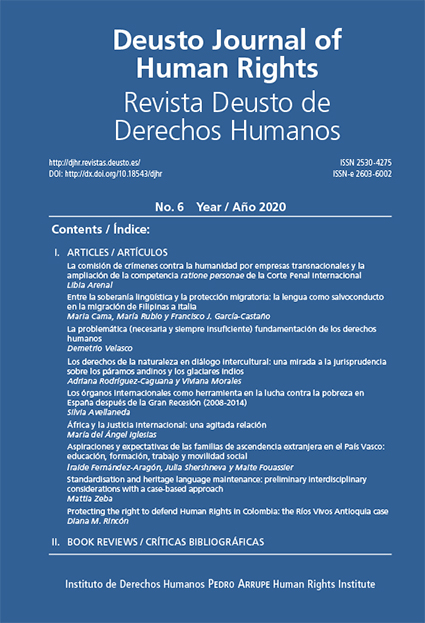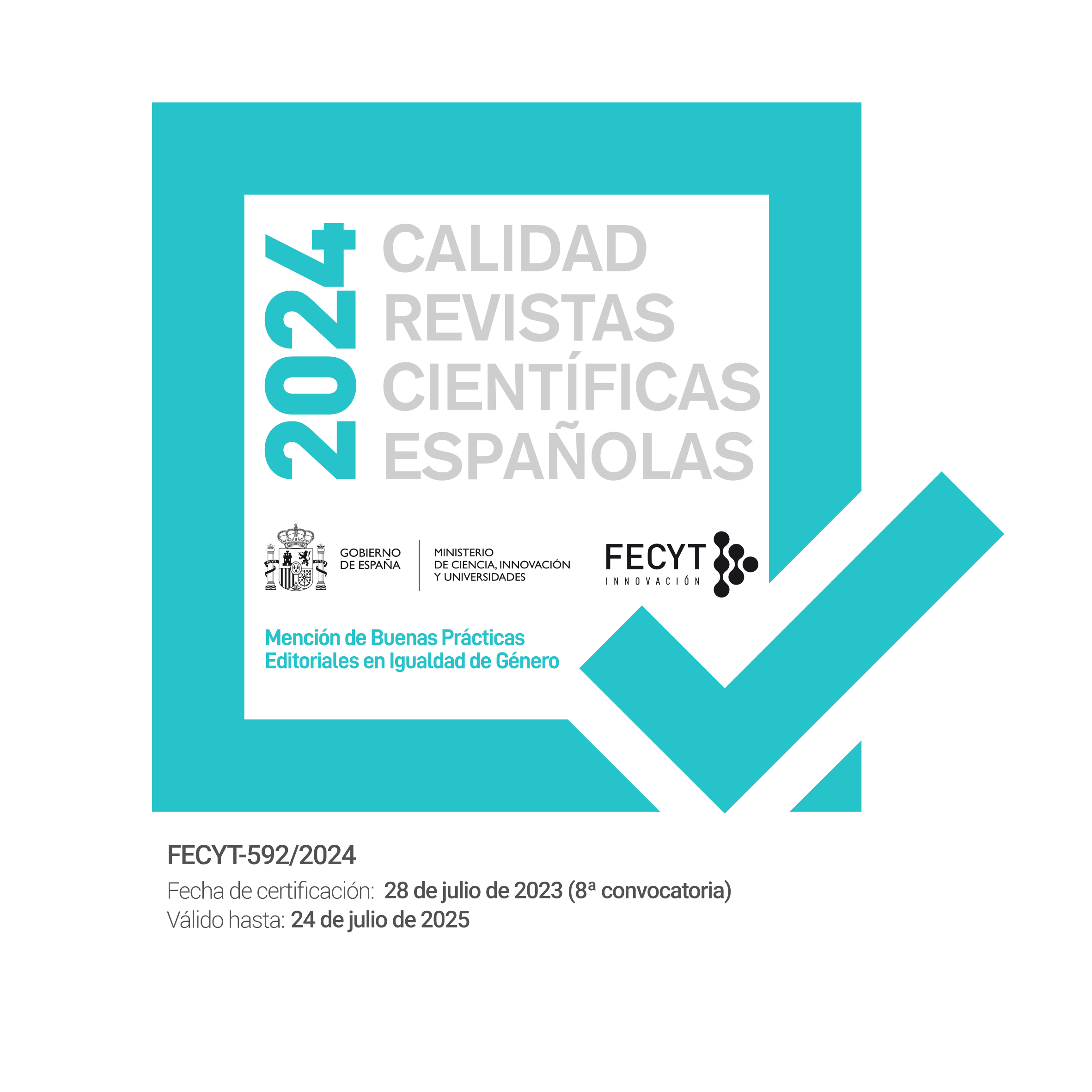África y la Justicia Internacional: una agitada relación
Resumen
El presente trabajo tiene como objetivo el poner sobre la mesa el problema habido sobre las relaciones entre los Estados africanos y la justicia internacional, en especial por lo que al Tribunal Penal Internacional se refiere. Trata de mostrar que, si bien el Protocolo de Malabo no ha tenido el éxito esperado por sus redactores, la justicia regional ha estado trabajando demostrando su eficacia. Y es que diversas causas, como el malestar de los Estados del continente por sentirse foco de atención de La Haya clamando una suerte de doble estándar en la actuación de la Corte Penal o un atentado a la soberanía de los Estados, han conducido al renacimiento de un nacionalismo africano que parece concretarse en la creación de tribunales híbridos o en una paralela justicia doméstica; ello, junto al establecimiento de procesos de justicia restaurativa y transicional en África. Se entiende así que quizás es este tipo de justicia, regional y no internacional, la llamada a ofrecer la debida justicia, investigando y enjuiciando a los culpables que resulten de los crímenes internacionales que se suceden en el continente.
Recibido: 04 marzo 2020
Aceptado: 12 noviembre 2020
Descargas
Citas
Abrisketa, Joana. 2016. «Al Bashir: ¿Excepción a la inmunidad del Jefe de Estado de Sudán y cooperación con la Corte Penal Internacional?», Revista Española de Derecho Internacional 68, n.º 1 (enero-junio): 19-47.
African Union. 2020. List of countries which have signed, ratified/acceded to the Protocol on amendments to the Protocol on the Statute of the African Court of Justice and Human Rights. Acceso el 19 de agosto de 2020. https://au.int/en/treaties/protocol-amendments-protocol-statute-african-court-justice-andhuman-rights
Akande, Dapo. 2008. «Prosecution of Senior Rwandan Government Official in France: more on immunity», EJIL: Talk. Acceso 19 de agosto de 2020. https://www.ejiltalk.org/prosecution-of-senior-rwandan-governmentofficial-in-france-more-on-immunity/.
Bakama, Eugene B. 2108. «The surrender of Albert Yekatom to the ICC: an infringement of the positive complementarity principle? », International Criminal Justice Africa. Acceso el 19 de agosto de 2020. https://www.icjafrica.com/single-post/2018/11/27/The-surrender-of-Albert-Yekatom-tothe-ICC-an-infringement-of-the-positive-complementarity-principle.
Carroll, Caitlin E. 2013 «Hybrid Tribunals are the Most Effective Structure for Adjudicating International Crimes Occurring Within a Domestic State» Law School Student Scholarship 90: 1-30. Acceso el 19 de agosto de 2020. https://scholarship.shu.edu/student_scholarship/90.
Castel, Andoni. 2009. «La Justicia tradicional en la reconciliación de Rwanda y Burundi», Revista CIDOB D’Afers Internacionals 87: 53-63.
CBS News. 2018. «John Bolton says U.S. will not cooperate with International Criminal Court». Acceso el 6 de marzo de 2020. https://www.cbsnews.com/news/national-security-adviser-john-bolton-speaks-at-federalistsociety-live-updates/.
Clark, Phil. 2019. «Why international justice must go local: the ICC in Africa», Africa Research Institute. Acceso el 19 de octubre de 2020. https://www.africaresearchinstitute.org/newsite/publications/why-international-justicemust-go-local-the-icc-in-africa/.
Diallo, Youssoupha. 2018. «Les Chambres Africaines Extraordinaires. De la dissolution á la survivance», e-Revue Internationale de Droit Pénal (eRIDP), A-03: 1-17. Acceso el 19 de octubre de 2020. http://www.penal.org/es/eridp-2018.
Giselt, Karen. y Tatiana Rosero A. 2017. «Justicia sobre la hierba. Tribunales Gacaca, lecciones de reconciliación para Colombia», Estudios Políticos 51, 218-239. DOI: 10.17533/udea.espo.n51a11.
Fernández Arribas Gloria. 2019. «Corte Penal Internacional y crimen de agresión: el levantamiento de inmunidades mediante la remisión de asuntos por el Consejo de Seguridad», Revista Española de Derecho Internacional 71, n.º 2: 195-221.
Høgestøl, Sofie A. 2016. «The Habré Judgment at the Extraordinary African Chambers: A Singular Victory in the Fight Against Impunity», Nordic Journal of Human Rights 34, n.º 3: 147-156, DOI: https://www.doi.org/10.1080/18918131.2016.1233374.
Human Rights Watch. 2011. «Justice compromise. L’héritage des tribunaux gacaca du Rwanda», Acceso el 15 de agosto de 2020. https://www.hrw.org/fr/report/2011/05/31/justice-compromise/lheritage-des-tribunauxcommunautaires-gacaca-du-rwanda.
Jalloh, Charles. Kamari M Clarke & Vincent O. Nmehielle, Eds. 2019. The African Court of Justice and Human and Peoples’ Rights in Context: Development and Challenges. Cambridge: Cambridge University Press. doi:10.1017/9781108525343 Justice Truth Dignity. 2019. The future of International Criminal Justice in Africa. Acceso el 19 de octubre de 2020. https://www.ictj.org/news/futureinternational-criminal-justice-africa
Institut International pour la Paix. 2009. Africa is reforming, Rwandan President Kagame Tells IPI Audience. Acceso el 15 de agosto de 2020. https://www.ipinst.org/2009/09/africa-is-reforming-rwandan-president-kagame-tells-ipiaudience
Kahombo Balingene. 2018. «Bemba’s acquittal by the Appeals Chamber of the International Criminal Court: Why is it so controversial?» International Criminal Justice Africa. Acceso el 19 de octubre de 2020. https://www.icjafrica.com/single-post/2018/07/09/Bemba%E2%80%99s-acquittal-bythe-Appeals-Chamber-of-the-International-Criminal-Court-Why-is-it-socontroversial.
Lepidi Pierre. 2019. «Rwanda : les "gacaca", ces tribunaux populaires par lesquels le ‘miracle’ est arrivé». Le Monde Afrique. 13 de abril. Acceso el 19 de octubre de 2020. https://www.lemonde.fr/afrique/article/2019/04/13/les-gacaca-ces-tribunaux-populaires-par-lesquels-le-miracle-rwandais-estarrive_5449857_3212.html.
Matiyas, Eden. 2018. «What prospects for an African Court under The Malabo Protocol?». Acceso el 19 de octubre de 2019. https://www.justiceinfo.net/en/other/37633-what-prospects-for-an-african-court-under-the-malaboprotocol.html.
Nel, Michele. 2018. «Can a regional court be a viable alternative to the ICC in Africa?» The Conversation. Acceso el 19 de octubre de 2020. https://theconversation.com/can-a-regional-court-be-a-viable-alternative-to-theicc-in-africa-100788.
Organización para la Unidad Africana (OUA). 2000. Acta Constitutiva de la Unión Africana. Lomé (Togo), 11 de julio de 2000.
Ouguergouz, Fatsah. 1993. La Charte africaine des droits de l’homme et des peoples: Une aproche des droits de l’homme entre tradition et modernité. Ginebra: Graduate Institute Publications. doi: https://www.doi.org/10.4000/books.iheid.2184.
Parlamento Europeo. 2008. Pregunta escrita de fecha 25 de noviembre de 2008. OJ C 316, 23/12/2009. Acceso el 19 de octubre de 2020. https://www.europarl.europa.eu/sides/getDoc.do?pubRef=-//EP//TEXT+WQ+E2008-6318+0+DOC+XML+V0//EN&language=GA.
Penal Reform International (PRI). 2010. La contribution des juridictions Gacaca au règlement du contentieux du génocide. Apports, limites et attentes sur l’après Gacaca, Rapport final de monitoring et de recherche sur la Gacaca. Acceso el 19 de octubre de 2020. https://cdn.penalreform.org/wp-content/uploads/2013/06/Gacaca_final_2010_fr.pdf
Robles, Margarita. 2014. «El Principio de Jurisdicción Universal: estado actual y perspectivas de evolución» Revista Española de Derecho Internacional LXVI/2: 81-111.
Sansani, Inbal. 2001. «The Pinochet Precedent in Africa: Prosecution of Hissène Habré». Human Rights Brief, American University Washington College of Law 8, n.º 2: 8.
Shilaho, K. Westen. 2018. «The International Criminal Court and the African Union: Is the ICC a bulwark against impunity or an imperial Trojan horse?», African Centre for the constructive resolution of disputes, Acceso el 19 de octubre de 2020. https://www.accord.org.za/ajcr-issues/theinternational-criminal-court-and-the-african-union/.
Sirleaf, Matiangai. 2016. «The African Justice Cascade and the Malabo Protocol», University of Pittsburg School of Law. Legal Studies Research Paper Series. Working Paper 2017-1, 1-36.
Sirleaf, Matiangai. 2016. «Regionalism, regime complex & the crisis in International Criminal Justice», Columbia Journal of Transnational Law 54: 699-798. Acceso el 19 de agosto de 2020. http://blogs2.law.columbia.edu/jtl/wp-content/uploads/sites/4/2016/05/Sirleaf_54-CJTL-699.pdf
Sosa, Marta. 2014. «África y la justicia transicional: los tribunales «Gacaca» de Ruanda», Revista de la Federación de Comités de Solidaridad con el África Negra. UMOYA. Acceso el 19 de agosto de 2020. https://umoya.org/2014/02/06/africa-y-la-justicia-transicional-los-tribunales-gacaca-deruanda/.
Stewart, James. 2018. El artículo 28 del Estatuto de Roma, Cámara de Comercio de Bogotá, 1 de noviembre de 2018.
Sullo Pietro. 2018. «Beyond Genocide: transitional justice and the Gacaca Courts in Rwanda, The search for Truth, Justice and Reconciliation». International Criminal Justice Series 20, Springer: Asser Press
Times Reporter. 2009. «Makuza scoffs at ICTR over negative influence», The New York Times, Acceso el 19 de septiembre de 2020. https://www.newtimes.co.rw/section/read/13357.
Tribunal Internacional de Justicia. 2012. Questions concernant l’obligation de poursuivre ou d’extrader (Belgique c. Sénégal) Fallo de 20 de julio de 2012. Acceso el 19 de septiembre de 2020. https://www.icj-cij.org/files/case-related/144/144-20120720-JUD-01-00-FR.pdf.
Tribunal Penal Internacional. 2016. «The Office of the Prosecutor». Policy paper on case selection and prioritization. 15 September. Acceso el 19 de septiembre de 2020. https://www.icc-cpi.int/Pages/item.aspx?name=policypaper-on-case-selection-and-prioritisation.
Deusto Journal of Human Rights / Revista Deusto de Derechos Humanos es una revista de Acceso Abierto; lo que significa que es de libre acceso en su integridad inmediatamente después de la publicación de cada número. Se permite su lectura, la búsqueda, descarga, distribución y reutilización en cualquier tipo de soporte sólo para fines no comerciales y según lo previsto por la ley; sin la previa autorización de la Editorial (Universidad de Deusto) o la persona autora, siempre que la obra original sea debidamente citada (número, año, páginas y DOI si procede) y cualquier cambio en el original esté claramente indicado. Cualquier otro uso de su contenido en cualquier medio o formato, ahora conocido o desarrollado en el futuro, requiere el permiso previo por escrito de la persona titular de los derechos de autoría.



3.jpg)
3.jpg)
3.jpg)
.jpg)








